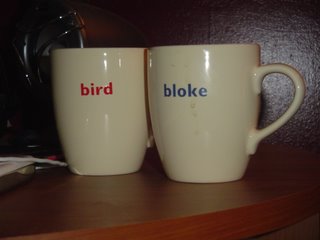 This morning, the monk and I were IMing from either end of the computer room simultaneously having an inane chat, too. On the vocal level, we were discussing the merits of coffee. This type of conversation is generally a war of attrition in more peaceable terms; the victor erodes the loser's sense of patience enough to cajole them into being the one to make the trip upstairs to refill the cups. On the IM, we were discussing my recent illness (a nasty lingering respiratory infection type thing, that has sapped all my patience and energy as well as my oxygen.) "How geeky is this?" he asked me. My response: "I dunno, I'll google to find out." So, I suppose *that* settles that question.
This morning, the monk and I were IMing from either end of the computer room simultaneously having an inane chat, too. On the vocal level, we were discussing the merits of coffee. This type of conversation is generally a war of attrition in more peaceable terms; the victor erodes the loser's sense of patience enough to cajole them into being the one to make the trip upstairs to refill the cups. On the IM, we were discussing my recent illness (a nasty lingering respiratory infection type thing, that has sapped all my patience and energy as well as my oxygen.) "How geeky is this?" he asked me. My response: "I dunno, I'll google to find out." So, I suppose *that* settles that question.So, returning for the nonce to the subject of books; I read recently an essay by Douglas L. Wilson, Lincoln the Persuader. This excellent essay covers not merely the scope and tenor of Lincoln's literary achievements, but describes the methods and attitudes Lincoln had towards writing:
Sounds like Lincoln might have been an interesting blogger. My favorite part of this concise essay is Wilson's analysis of Lincoln's response to Horace Greeley's "Prayer of Twenty Millions," which Greeley published as editor of the New York Tribune in August of 1862. Wilson provides all the necessary context for understanding Lincoln's response - that it was the nadir of his presidency; that he had to postpone the issuance of the emancipation proclamation due to the poor military results; and the burden of the precedence of the presidency on his actions. In spite of these limitations - or perhaps because artistry can flourish when confined - Lincoln's response accomplished an "piece of ingenious jujitsu" by deflating Greeley's errors and insults and ultimately rendering them unimportant, and instead speaking to a matter close to his heart - emancipation. Lincoln left no doubt in his statement that emancipation was a dear goal; however, he also respected practicality enough to know that emancipation could not be declared until it could be made real.Writing was often a form of refuge for Lincoln, a place of intellectual retreat, where he could sort through conflicting opinions and order his thoughts with words.
Another point Wilson makes very neatly is that Lincoln was working, through the media, to bring about the change he wished to see in the U.S. He was notably the first president to so address the public - directly, in response to criticism offered, and as clear explanation of his intentions and goals, without verbal subterfuge and trickery. His actions could serve as a model for our president today.
Now, I really need to finish Team of Rivals, so that I can next go back and further explore Wilson's other writings.
Lovely British mugs were a gift from Big Tomato Co.




0 comments:
Post a Comment